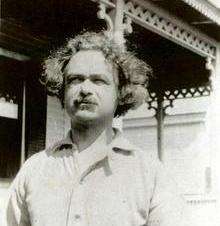Hippolyte Havel

Hippolyte Havel (1871–1950) was a Czech anarchist who lived in Greenwich Village, New York, which he declared to be "a spiritual zone of mind".[1][2] He was close friends with Emma Goldman.
In his youth, Havel had been imprisoned in what then was Austria-Hungary for anarchist activities; originally pronounced "criminally insane", he was declared sane by the intervention of Krafft-Ebing and transferred from the prison madhouse to an ordinary prison.[3] He managed to flee to London, where he met Emma Goldman, who then brought him to America.[3]
In 1900, Havel accompanied Goldman in a visit to Paris, France in preparation for the September International Anti-Parliamentary Congress.
Havel was the editor of several anarchist publications, including the Chicago Arbeiter Zeitung,[3] The Revolutionary Almanac (1914), and Revolt (1916).
He was married to the anarchist Polly Holliday, who with him ran a restaurant on Washington Square in Greenwich Village frequented by radicals and artists,[3] but may also have been Goldman's lover.[4] In the late 1910s, Havel took in Berenice Abbott as his adopted daughter.
He wrote a biography of Emma Goldman and an introductory essay to her collected Anarchism and Other Essays.
Havel was friends with Eugene O'Neill, who based the character Hugo Kalmar of The Iceman Cometh on Havel.[5]
The Yale Hippolytic (or The Hippolytic), a left-wing student publication at Yale University, is named after Havel and his life of cosmopolitan dissent.
See also
References
- ↑ Havel, Hippolyte (14 Aug 1915), "The Spirit of the Village", Bruno's Weekly: 34–35
- ↑ McFarland, Gerald W. (2005), Inside Greenwich Village: A New York City Neighborhood, 1898-1918, Amherst, Mass.: University of Massachusetts Press, p. 207, ISBN 978-1-55849-502-9
- 1 2 3 4 Alexander, Doris (1962). The tempering of Eugene O'Neill. Harcourt Brace & World.
- ↑ Chalberg, John. Emma Goldman: American Individualist. New York: HarperCollins Publishers Inc., 1991. ISBN 0-673-52102-8.
- ↑ Alexander, Doris (2005). Eugene O'Neill's last plays: separating art from autobiography. University of Georgia Press. ISBN 0-8203-2709-3.
External links
- Works by Hippolyte Havel at Project Gutenberg
- Works by or about Hippolyte Havel at Internet Archive
- Photo of Hippolyte Havel